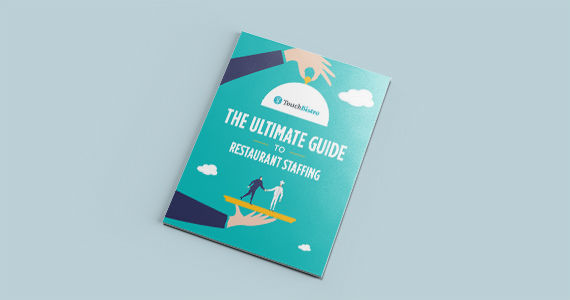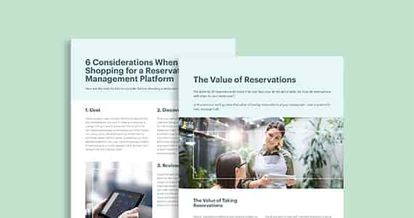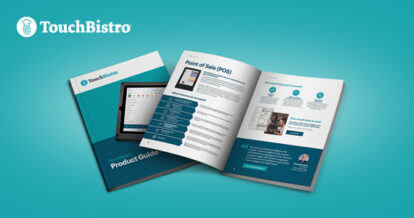Hiring the right candidates has a positive impact on customer service, team morale, and profits.
But choosing candidates can be a tricky and stressful process. Not only do you have to prepare for the interview, ask the right restaurant interview questions, and guide the interview process, but you also have to decide who’s a fit, who’s passionate, and who’s answering honestly – and not just following a script.
Here are the 19 most important restaurant interview questions that will help you simplify the interview process, fill open jobs, and build the best possible team.
These include everything from server interview questions to ask and interview questions for managers to second interview questions and even some great follow-up questions.
With each question, you’ll learn:
- What to ask and why each question is important
- What constitutes a good answer from a candidate
- How to identify red flags before hiring
Let’s get started.

Learn how to hire, train, schedule, and retain restaurant staff.
Common Restaurant Interview Questions and Answers
1. Tell Me a Little More About Yourself
A candidate will always feel nervous at the start of an interview. By asking them to provide more information about themselves, you help break the ice.
When a candidate answers this question, here’s what you should be looking for:
- Details not mentioned on the resume. Anyone can regurgitate information from a resume.
- Specifics about their personality and transferable skills. For example, look for good communication and a friendly demeanor, which are desirable traits in the hospitality industry
Possible red flags include candidates not having much to say, repeating what’s on their restaurant resume, and (for certain roles) being shy.
But be careful. Some candidates may take more time to warm up to you, so don’t make your full assessment of their personality until the end of the interview.
2. Why Did You Get Involved in the Restaurant Industry?
This question helps you understand a candidate’s career motives and whether they’re passionate about working in the industry.
When candidates answer this question, focus on what they say and how they say it. Anyone can claim to be passionate about their work – it’s much harder to embody it. If they speak enthusiastically, it’s highly likely they’re genuinely passionate about this industry.
Potential red flags include common responses most people give and monotonous answers that lack passion.
3. What Do You Know About Our Restaurant?
Would you hire someone who didn’t take some time to learn at least a bit about what you do?
Probably not.
The answers to this question help you gauge how enthusiastic and interested candidates are about the job and the work.
A great response should show you the candidate researched your restaurant and has, at least, a basic understanding of how it operates (i.e. the type of food you serve and your concept).
Be wary of candidates who stumble over their words; it may be because they have no clue what you actually do.
4. Why Did You Apply for a Job at Our Restaurant?
A common answer to the above question might be, “You’re the best restaurant in town.”
Great. But you’re looking for more than that.
In these instances, dig deeper. Ask the candidate, “So what makes us the best restaurant in town?”
The goal here is to understand their motives. Do they just want any job? Or are there specific reasons why they want to work for you and join your team?
A great response includes details. Maybe the candidate chose you because they know people who work at your restaurant and they’ve heard of your wonderful team dynamic. Or, perhaps the candidate learned about opportunities for advancement (which would be great because then you know the candidate wants to grow with you).
If the candidate has no real reason for applying besides it being another job, you may choose to remove them from your shortlist and keep looking for the right person.
5. Do You Have Qualities Needed to Work in the Restaurant Industry?
There are certain qualities you need to work in the restaurant industry, such as being social, as well as communication and teamwork skills. A great response to this question goes beyond a resume and includes:
- A solid understanding of what the job entails. They know the hard work, attention to detail, and communication required to do a good job.
- Specific examples that showcase their abilities – from their time working in the restaurant industry or outside of it.
They candidate could tell you about a prior job in a similar position or an unrelated job that demonstrates transferable skills or abilities.
For example, someone who works on a dairy farm – a tough job that involves getting up early – could use that experience to highlight their ability to arrive on time and work hard.

Learn how to hire, train, schedule, and retain restaurant staff.
6. Describe Your Favorite Dish and Why You Love It
Get the candidate to imagine you’re a customer. Make them sell the dish!
This question helps you gauge if a candidate can think on their feet, communicate confidently, and describe high-profit dishes to boost profits. You should be looking for a detailed answer that not only makes your mouth mater, but also entices you to buy.
7. Do You Have an Example of a Time You Went the Extra Mile to Help a Customer?
You want dedicated staff who are willing to go beyond their restaurant job descriptions to help people and add value to your restaurant. After all, employees who go the extra mile encourage repeat customers and build your reputation.
A good response includes evidence – maybe through an example – of a time when they went above and beyond expectations to make sure a guest had a great experience.
Failing to have an example doesn’t mean the employee is a bad employee – but this may prove to be the deciding factor when you’re looking to separate the average candidates from the top-performers.
8. Tell Me About a Time You Had to Deal with a Difficult Customer at Work. How Did You Handle It?
Dealing with disgruntled customers is very much a part of working in the restaurant industry – especially for front of house staff. It’s essential, then, that potential employees know how to handle confrontation at work.
When you ask candidates about a time they had to deal with a difficult customer, look for evidence that they can manage these situations with calm professionalism.
Ask yourself: In the scenario the candidate described, were they able to stay patient? Did they keep a cool head the whole time? Did the customer leave (reasonably) satisfied that the issue was resolved?

9. What Does “Teamwork” Mean to You?
This question establishes how the candidate feels about an important success factor in the restaurant industry: teamwork.
An great response to this question includes detailed examples of the candidate’s experience working as part of a team and their positive contribution. Maybe they introduced the idea of team dinners or went beyond their job description to help another staff member during a busy service.
10. Describe Your Ideal Manager
A candidate may be highly qualified and check all the boxes, but struggle to work with other team members or work under someone because of their management style.
Here’s what you should be looking for in the applicant’s response:
- Characteristics of their ideal manager should fit the management style of the restaurant
- A detailed answer
Vague responses like “A manager who treats me well,” or “Doesn’t get in my way,” may suggest they’re not the right fit for your team.
Consider your own management style and compare that to their answer.
11. Are You an Honest Person?
Honesty matters. Need we say more? You don’t want dishonest employees who lie and, worse, steal.
“Yes,” would obviously be an ideal answer here. But because most people will say “yes,” look for hesitation or a pause before they do. This may suggest they’re lying. A great example that showcases honesty would be something like, “I once saw a guest drop $100 and walk off. I went over, picked up the $100, and returned it.”
12. What Are Your Salary Expectations?
It’s best to get salary expectations out of the way in the first interview – instead of waiting until the end of the hiring process. If the candidate’s expectations are above what you can offer, you won’t be a good match.
A great response includes details on exactly how much the candidate expects to earn per week or month. Of course, the best answer will be one where both your expectations align perfectly.
But perfect alignment isn’t always possible. if you’re close, and you want to make an offer, you may choose to negotiate and find a good compromise that works for both parties.
13. How Long Have You Been a Manager / Server / Cook / Other Job Title?
A simple, yet highly effective question that helps you discover:
- How much experience they have working in that specific role
- Whether they have the skills to do the job
- If you’ll have to train them (and how much time that might take)
Any decent answer will furnish all relevant details:
- Where they worked
- For how long
- What their duties were
- And, if in a management position, how many employees they managed
Of course, just because they don’t have experience working in your industry doesn’t mean they can’t do the job. Applicants may have transferable skills and abilities. They may also be fast learners, highly coachable, and have all the characteristics to succeed.
In the end, it’s your hiring decision. Do you want to invest time in training? Do you see a future with this employee on your team?

Learn how to hire, train, schedule, and retain restaurant staff.
14. How Would You Describe Your Management Style?
The next few questions are designed to help with hiring a new manager.
This one will help you determine whether a candidate has a management style that fits your restaurant’s culture and how self-aware they are about the way they lead a team.
You should be looking for an answer that accurately describes their management style at work. Is it casual, authoritative, or consultative? Then compare their responses to your restaurant’s management style and ask yourself if that style works for you and your team.
If yes, you have a winner. If not, you may have to let the candidate go, even if they’re well qualified.
Also remember that if you really like the candidate, you shouldn’t be afraid to take a chance on hiring them and work on adjustments to their management style as you go.
15. How Has Your Management Style Evolved over the Years?
The purpose here is to see if the candidate has grown. A positive response demonstrates a keen self-awareness of how their management approach has changed over time as they’ve become more experienced.
For example:
“When I started, I used to micromanage my staff – not because I was a lousy manager, but because I cared about following certain working standards. Over time I realized this micromanagement was crippling my employees and their work. My team didn’t trust me. Some even resented me! So I took a more hands-off approach and let them get on with it. Naturally, I still checked in, but I trusted they would get things done, and they did.”
If someone has remained stagnant in their position as a restaurant manager over the years, rarely changing their management style, you may tentatively mark that as a red flag.
Of course, if their approach works and gets results, then why fix what’s not broken?

16. Tell Me About a Time You Had to Deal with an Underperforming Employee. How Did You Handle It?
Dealing with underperforming employees is very much a part of any manager’s job, so you want to make sure the candidate actually has experience doing this.
When asking a candidate about a time they had to deal with an underperforming employee, a great response should:
- Clearly highlight their ability to deal with these issues
- Showcase that they’re not afraid of confrontation at work despite the discomfort it may cause
- Demonstrate thoughtfulness and tact in managing a variety of situations
For example, a manager should handle these two situations differently:
- Underperformance due to a family tragedy at home
- Underperformance for no reason other than laziness
In the first instance, the manager, after confronting the employee and learning about the family problems, may choose to give the employee some time off work. In the second instance, the manager may decide to give the employee a warning.
Follow-Up Restaurant Interview Questions
Follow-up questions are a common way to get more information from candidates and help you fill certain gaps before hiring. Here are three you should ask:
17. Is There Anything We Discussed That You’d Like to Elaborate On?
It doesn’t matter how well-prepared interviewees are, sometimes they forget to share information due to nerves. Part of being a great interviewer is understanding this and following up to ensure you get the information to make an informed hiring decision.
18. Is There Anything We Didn’t Discuss That You’d Like to Add?
As an interviewer, you control the direction of the interview. You set questions that the candidate will answer. As a result, sometimes candidates don’t get the opportunity to provide you with information on other work skills and knowledge they have that may help them get the job. The idea here is to probe for this information and help them put their best foot forward.
19. Why Do You Think You’re the Best Candidate for the Job?
You may or may not have asked this question during the initial interview. In either case, it’s a great question for both you and the interviewee: You get a quick summary of why they think they’re the best candidate for the job, and the candidate has one last chance to sell themselves to you.
Hiring the right candidates is crucial to the success of your restaurant, and it’s one of the hardest things to get right – especially when it comes to contactless hiring. The entire process – from selecting interview questions to deciding which candidate is the right fit for your team – can be challenging and can take up a big chunk of your time.
But the restaurant staffing process can go smoothly if you’re prepared. Simplify your interview process:
- Ask these 19 restaurant interview questions
- Understand what constitutes a good response
- Identify important red flags before hiring
Good luck out there!

Learn how to hire, train, schedule, and retain restaurant staff.
Download your free employee handbook template
Subscribe to the TouchBistro Newsletter







